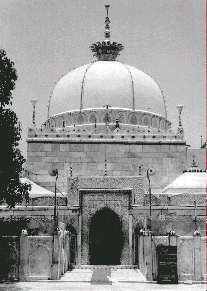
| 786 The Zahuri Sufi Website |
Short excerpts from 'The Psalm of Love' by Dr Zahurul Hassan Sharib Published in 1990 by Sharib Press (I) "Happiness and joy man wants to gain, but everywhere he is in pain. The sweet scented manuscript of life is torn with strife. What are those things which a person should assiduously, incessantly and constantly pusue, to obtain and attain, If he really wants to get happiness and avoid pain. To rise to a higher sphere of life is within the power of man. He must try, and of course he can. His search for happiness and joy will not be rewarding, unless he overcomes those things which are hindering. To get happiness,the zest of life, and joy, he should stop playing with every toy. There can be no two opinions that, without inner peace and tranquillity, he cannot experience ecstacy or get felicity. Without the spirit of give and take in life, there is sure to be strife. Of what use is it for us to be good, and even if we become good, of what use will it be to us if we do not do good? To do good implies to be of some use to others, to show sympathy to others and to be guided by the spirit of sharing service and sacrifice. It is axiomatic to say that a person cannot be good unless he does good and he cannot do good unless he himself is good. The problem constitutes a challenge to our sense of proportion and perspective. It calls for a solution. How then to avoid strife and stagnation and lead a calm, placid and happy life?" (II) "Let us approach the towering Sufi Saint Khawaja Moinuddin Hasan Chishti (d.1229 A.D.) for the solution to our unhappiness misery, inner conflict, egoism. pessimism, loss of hope, loss of initiative, and the betrayal of our refined sentiments, resulting in the loss of the urge to better life and better living." When questioned about his statement that there is no better thing before God than prayer, Khawaja Gharib Nawaz (Patron of the Poor), as he is often called, explained that the prayer he referred to was: "Hearing the complaints of the aggrieved and assisting them; helping the helpless; feeding the people and freeing the captives from captivity..." "At the close of his life in this world these words were inscribed on the forehead of the great saint by an Unseen Hand: HE WAS A BELOVED OF GOD AND HE DIED IN THE LOVE OF GOD" Here are some of the ways in which Khawaja Muinuddin Hasan Chishti spoke of love as quoted by Zahurmian in 'The Psalm of Love': __________ "The noise of the lover is only up to the time that he has not seen his Beloved. Once he sees the Beloved he becomes calm and quiet, just as the rivers are boisterous before they join the ocean, but when they become mingled with the ocean they cease to be boisterous. They are becalmed forever." __________ "He, indeed is constant and firm in love, who voluntarily, gladly and willingly, accepts all troubles, tribulations, trials, and tirades without a grudge, groan, shriek or murmer." __________ Inquiring about the blindness of a Dervish he had met in Bokhara, Khawaja Muinuddin Hasan Chishti received the following reply from him. "When I reached the highest pinnacle of perfection and I could see nothing except the All-Pervading Majestic Glory of God Almighty, it so happened one day that my eyes were unfortunately cast on other than God. Immediately thereafter I heard a voice admonishing me with these words: 'O, claimant! thou claimest to love Us only, but thou seest, and art not ashamed of seeing other than Us.' On hearing this voice, (continued the dervish) I felt ashamed and I with due humility remorsefully prayed to God: "May the eyes which see anything other than Thee, lose sight." I had not yet finished my whole prayer, before my eyes were deprived of sight. __________ At the conclusion of 'The Psalm of Love' Dr Sharib adds his own dictum: 'Take Love as best and leave the rest'. |


| Sharib Press |


| The Holy Tomb of Khawaja Muinuddin Hasan Chishti in Ajmer, Rajasthan, India. Khawaja Muinuddin Hasan Chishti was born in Isfahan and brought up and educated in Sanjar. He is a sufi saint of the Chishti Order and was a disciple of Khawaja Uthman Harooni. The fountain -head of the Order is Hazrat Abu Ishaq of Syria. The tomb is still visited today by myriads of people from both far and near. The Urs (or death anniversary) is celebrated annually, according to the lunar calendar, and attracts up to half a million people each year. Throughout the year, but especially at Urs time, this is also a great center for qwaali* - the singing of praises to God and his Prophets and saints and on sufi themes of Divine Love. *The Culture of The Sufis describes the significance of this form of worship in some depth. |
